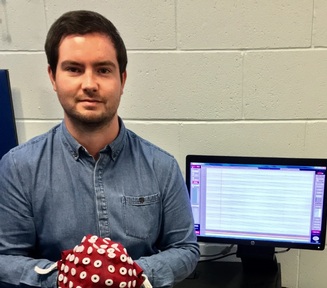Dementia's 'memory man' hunts for early diagnosis with carer volunteers
Dementia researcher, Dr Michael Craig, is on a mission to find a diagnosis for dementia in its early stages. His work on memory has also led him to the conclusion that ten-minute rests after learning new information can help people with dementia retain information.

He works with a group of carer volunteers organised by the Alzheimer’s Society called Research Network Volunteers who help him understand the practical and emotional aspects of what it’s like to have dementia.
The researcher explains that the volunteers “are people who have lost, or who care for family members with dementia, and they very much have hands-on experience.”
He continues. “They are the experts really at the Society and look at how research can be delivered.”
Resting 10 minutes after learning information improved memory
Dr Michael Craig is a junior research fellow at Heriot-Watt University in Edinburgh, a role funded by the Alzheimer's Society, and he is currently undertaking a three-year research program. He says: “A lot of the work that we do in the lab and which this project is focussed on, is testing memory."
The work he undertakes is not aimed at finding ‘a cure’ for dementia but has the twofold aim of helping improve outcomes for those with dementia via improved memory and trying to find an early diagnosis test.
Dr Craig says: “One of the key aims of the project is to try and ultimately provide foundations for a new diagnostic test.
“One of my colleagues undertook some work around about 10 years ago now where she essentially asked healthy older adults and people with dementia to sit and rest 10 minutes immediately after learning some new information such as a short list of words or a short story."
The reasearch found some interesting brain activity on those with dementia. If they did rest quietly for those ten minutes after new learning then they remembered much more of that information.
This was the original foundation for the new work undertaken by Dr Craig and his team around “memory consolidation”.
Carer volunteers: the 'experts' at dementia research delivery
Dr Craig’s research combines sensitive memory testing methods with state-of-the-art brain activity recording methods, using an EEG scan. This enables him to establish the brain activity that is associated with the consolidation of new memories.
He explains: “During a quiet rest period memories are being consolidated or strengthened and integrated within the brain in the memory area, and these memory areas are one of the first areas in the brain to be affected by dementia.”
The researcher continues: "Recent research from our lab has shown that if people with Alzheimer's disease simply rest quietly for a few minutes after learning something new, they can remember learned information much better."
Dr Craig is assisted by volunteers who are people who have lost or who care for family members with dementia.
One of the really nice aspects of having these dementia research volunteers, he says is that there are usually two or three allocated to each project. Dr Craig worked with two network volunteers during his Ph.D. and is currently working with two volunteers for the new research project.
They have regular meetings every six to eight months, and the research team provide them with an update on progress. The volunteers then offer their input and suggestions for each stage of the project.
Researchers haven’t ‘always been personally affected by dementia’
The Alzheimer's Society is a pioneer in public involvement in dementia research and their research network, established in 1999, now includes a team of over 280 carers, former carers and people living with dementia.
Mary Legge is a volunteer who joined the research network in the spring of 2017 after caring for her mother, who had vascular dementia and Alzheimer’s disease.
She wanted to do something constructive to support the work of the Alzheimer’s Society after having experienced the progression of Alzheimer’s first hand.
She retired two years ago and finds being involved in the network flexible, fitting nicely around her other life commitments. She says: “Being a research network volunteer has enhanced and broadened my understanding of dementia.
"Researchers may not always have been personally affected by dementia, and our personal experience of caring for someone with dementia, from both a practical and emotional perspective, helps us play a valuable role.”
Ms Legge has a few words of encouragement to those who are thinking of becoming a research network volunteer. She says: “Being a research network volunteer gives you the opportunity to have an active voice; don’t be daunted by the science!”
Latest Features News
 25-Nov-19
2019 Election: Boris Johnson leaves social care in 'too difficult box' but Labour vows to end 'crisis'
25-Nov-19
2019 Election: Boris Johnson leaves social care in 'too difficult box' but Labour vows to end 'crisis'
 18-Oct-19
Podcast: Wendy Mitchell and dementia: 'My biggest fear is not knowing who my daughters are'
18-Oct-19
Podcast: Wendy Mitchell and dementia: 'My biggest fear is not knowing who my daughters are'
 27-Sep-19
Exclusive: Care minister backs care workers' call for time off to grieve and attend funerals
27-Sep-19
Exclusive: Care minister backs care workers' call for time off to grieve and attend funerals
 19-Sep-19
Podcast: Gyles Brandreth says poetry helps ward off dementia
19-Sep-19
Podcast: Gyles Brandreth says poetry helps ward off dementia
 30-Aug-19
Edinburgh Fringe funnyman joins comics facing toughest audience at care home gig
30-Aug-19
Edinburgh Fringe funnyman joins comics facing toughest audience at care home gig